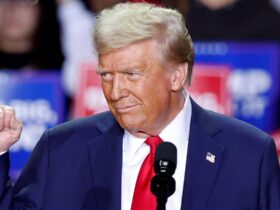In recent years, the European Union and Taiwan have quietly, but meaningfully, deepened their ties, especially in trade and technology.
The COVID-19 pandemic accelerated this shift, as European policymakers looked for ways to reduce overreliance on China. Taiwan, with its cutting-edge semiconductor industry and democratic governance, stood out as a natural partner.
But economics wasn’t the only driver. Growing unease over China’s geopolitical assertiveness, particularly in the Indo-Pacific, has led European leaders to reassess their strategic posture. Security concerns, coupled with the push for more resilient supply chains, brought Taiwan into sharper focus in EU foreign policy circles.
This progress, however, could be undone — not by Beijing, but by Washington.
President Trump’s reemergence on the international stage has already caused unease among America’s allies. His first term was marked by unpredictable trade policies and open skepticism toward longstanding alliances. By imposing tariffs on both rivals and partners and frequently shifting course, the Trump administration often left Europe scrambling to adapt.
The Biden administration, in contrast, worked to rebuild trust and promote policy alignment, particularly on China and Taiwan, after years of friction. That effort took on new urgency following Russia’s invasion of Ukraine, which reminded Europe of the need for solidarity among democracies.
But cracks are beginning to reappear. Within months of Trump’s return to power, signals of divergence have emerged, including in how Europe approaches China.
This growing rift matters. As Beijing steps up military pressure on Taiwan, the island doesn’t just need U.S. support — it needs a broad coalition of democratic partners willing to push back through coordinated, credible action. Trade ties, diplomatic engagement, and participation in multilateral forums all bolster Taiwan’s international standing.
If Europe drifts from Washington, or vice versa, Taiwan could find itself increasingly isolated. Ironically, a U.S. administration that seeks to confront China might end up making that harder by alienating the very allies it needs to succeed.
There’s already some evidence of this shift. In recent months, several European leaders have softened their rhetoric on China, emphasizing engagement over confrontation.
Some of that may be driven by economic concerns, but a lot of it has to do with trust — or the lack of it. If European capitals view Washington as unreliable or transactional, they may see more value in hedging their bets with Beijing.
Of course, the EU is hardly unified. While countries like Lithuania have taken bold stances in support of Taiwan, others — Germany and Italy, for instance — have shown more caution and in some cases, such as Hungary, even direct support for China.
A divided Europe, combined with a less dependable United States, would make for a dangerous cocktail in an already volatile global climate.
Trump’s foreign policy team may recognize China as a strategic threat, but they haven’t always understood the value of alliances. Washington can’t confront Beijing alone. Without European backing, U.S. efforts lose legitimacy, scale, and diplomatic reach.
Meanwhile, China is watching closely. Beijing has already made inroads by presenting itself as a stable alternative to Western unpredictability — especially in Africa, Latin America and the Pacific. If America once again turns inward or lashes out at its allies, Europe may have little choice but to pursue a more pragmatic, less principled relationship with Beijing.
Walking away from the groundwork laid by the Biden administration — like the Australia-United Kingdom-U.S. partnership, AUKUS, the U.S.-Indo-Pacific “Quad” cooperative and renewed EU-U.S. strategic talks — would be a costly error. Short-term political gains in Washington shouldn’t come at the expense of long-term global leadership.
The bottom line is simple: If the U.S. is serious about deterring Chinese aggression and defending Taiwan, it needs Europe. Not just as a symbolic partner, but as a committed one.
Undermining the transatlantic alliance isn’t just bad diplomacy. It’s a gift to Beijing — and a gamble Taiwan may not be able to afford.
Simona Grano is a senior fellow on Taiwan with the Asia Society Center for China Analysis and head of China-Taiwan Relations at the University of Zurich.
















Leave a Reply